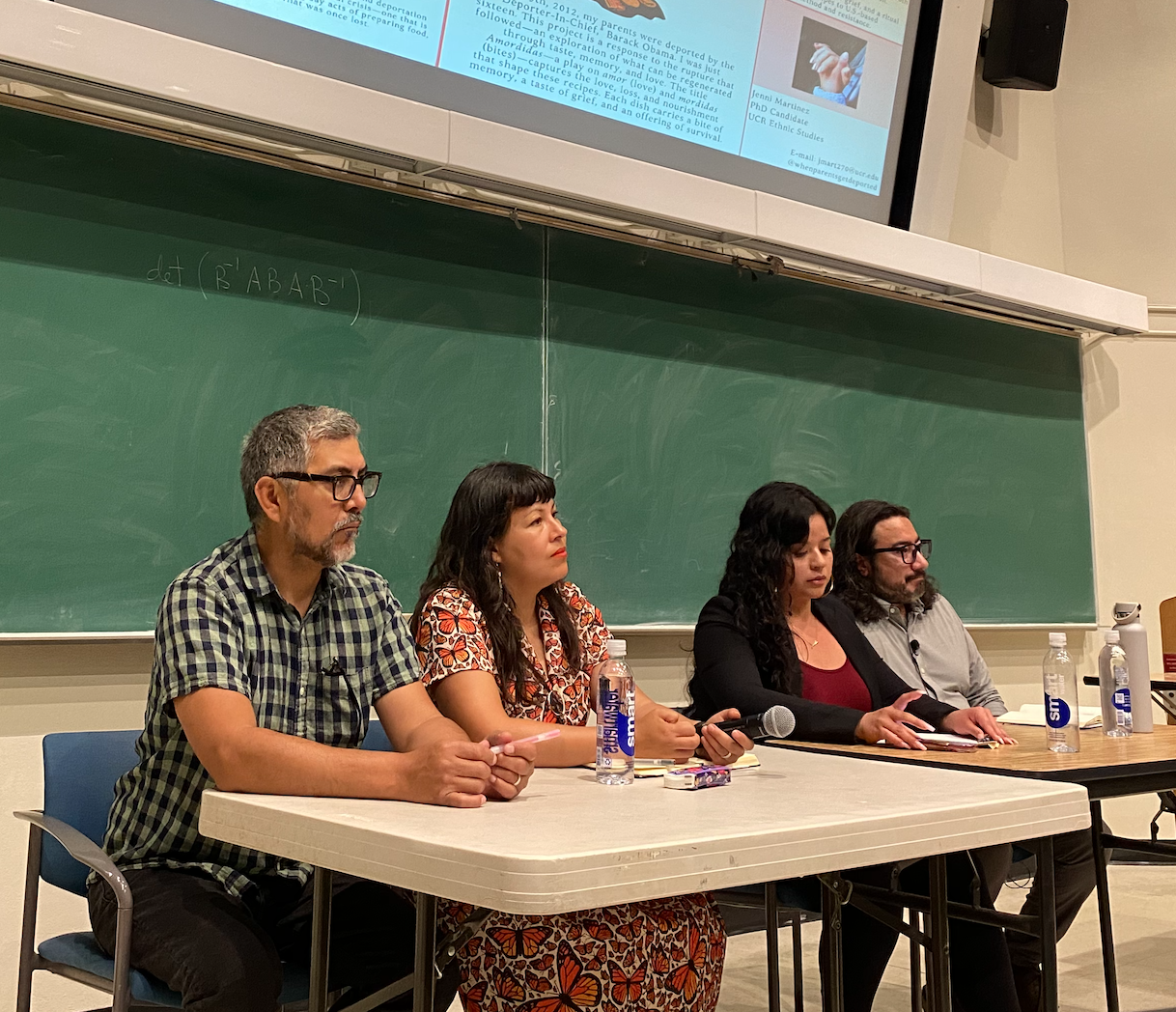News Date:
Content:

Jesus Maya, Paloma Villegas, Jenni Martinez and Alfredo Gonzalez
There are about 94,000 unnaturalized veterans living in the U.S. and they are less likely to socially integrate and hold jobs, and more likely to suffer from PTSD than other veterans, a UC Santa Barbara audience has heard. In presenting his research “Other Than Honorable: Deported Veterans and the Myth of Return,” UCSB Political Science professor Alfredo Gonzalez said suicide rates have gone up among undocumented veterans in the past 20 years, as have the rates of denying veterans citizenship.
“It’s as if there is a silent agreement when joining the military. Loyalty is expected but veterans are left feeling betrayed by the country they so proudly served,” Gonzalez said at a round table discussion hosted by the Department of Political Science, and was open to the public.
Gonzalez was speaking at “Between Objects and Subject: Studying the Politics of Deportation,” an interdisciplinary panel relaying research about the deportation from the migrant perspective. He was joined by Jenni Martinez, a doctoral candidate in ethnic studies at UC Riverside, as well as Paloma Villegas, associate professor of sociology at Cal State San Bernardino, and her husband, the poet and community organizer, Jesús Maya. Speakers approached the topic from the perspective of deportees—how they experienced displacement and how they navigate the impacts it had on them as individuals and on their identity.
Sociologist Villegas and poet Maya are married and spoke personally of their experiences as migrants in the U.S. who took the hard decisions to self-deport for better opportunities. They recalled learning about deportation not just through the news media and research findings, but on the family level, for example when a niece was playing with her friends in the backyard one day, and the next day was forcefully removed to Mexico, a place that is not her home. Maya said his sister’s deportation was the first one he experienced. The anticipation of who is next, waiting for what follows, is what Maya said he struggles with the most.
Villegas self-deported to pursue higher education in Canada, which was a smooth transition because she had legal status in the U.S. under the DREAM Act. It was not the same process for her husband and they were unsure if they would ever reunite. The difference in timelines, physical absence, lack of connection and community made it difficult to navigate their separation; it felt as if time and space was stolen from them.
“It was hard to be separated as a married couple,” Villegas said.
Now he is Canadian–Mexican and they are happily reunited. But, they still mourn their community in California, where they built relationships and nourished roots. Having been forced to leave and start over still takes an emotional and physical toll on them. “Without status, I had to bury my feelings and hide behind them,” Maya said. “But now it’s different – I have no shame to talk about our experience. I feel pride.”
UC Riverside doctoral candidate Martinez revealed that her family was deported when she was a teenager. She recalled having to travel across the border from school to go to visit her parents. She said her mother, who passed away in January, gave her a solid foundation. And she used the Spanish word amordidas, literally: bitten. “Amordidas is a bruise, a bite that lingers, something that is taken and never fully returned,” Martinez said.
Her research today is based on an intimate ritual where she cooks with deportees in order to convey their lived experience in her research. She said she was left with an unrecognizable sense when her parents were deported, and it’s her mission now to find the balance by the way of cooking and telling stories of other immigrant families.
The round table delved deeper than typical academic gathering and many in the audience were visibly emotional, touched by hearing from these four panelists. Words of encouragement and gratitude were exchanged, and attendees– some of whom could relate from their own lived experience – expressed gratitude that scholars are starting to research from the perspective of people they study. In this case, that’s revealing the immigrant perspective.
Brenda Lucas is a third-year Statistics and Data Science major. She wrote this article for her Digital Journalism class.






